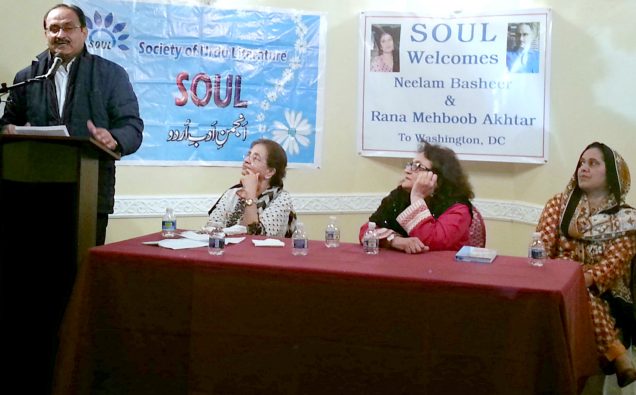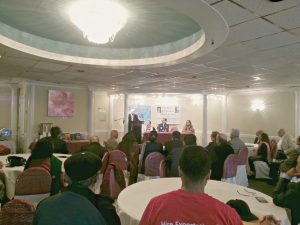
The 2016 political season – marked by long rhetorical campaigns and divergent slogans – has resulted in a vigorous debate about its impact on the American society. Particularly, the ‘us vs them’ sounding rhetoric – and implications in the form of rise in hate attacks – is also shaping works of writers and authors among all American communities in different ways.
To humanists, thinkers, interfaith leaders and globalists, especially those believing in the power of literature, the talk of divisions along ethnic or racial lines feels like a sudden sweep of icy winds taking away mellowness of a mild winter afternoon.
Charles Dickens once wrote for a character:
“When I am deceived or disappointed in–the wind, and it’s easterly, I take refuge here. The growlery is the best-used room in the house.”
Since the novelist used word growlery – literally a place to growl – in his famous novel Bleak House, it has also been interpreted as a place for retreat, a study, and a sanctuary for creative pursuits.
The famous lines and the growleries – platforms like book stores, art galleries, libraries and poetry evenings in educational institutions or private gatherings – acquire a special meaning when literary minds grapple with issues of conflicts, divisions, exclusionary thinking, and respond to them by fostering empathy, consideration for common humanity.
This past Sunday a literary gathering shed light on some of the contemporary challenges with a constructive discourse. The venue was the popular Aabshaar Restaurant in Springfield – a hub of cultural activities. Some of the finest contemporary literary minds gathered to share their thoughts, works and experiences under the banner of Society of Urdu Literature.
An exploration of some mysteries of life and high quality literary presentations turned the monthly SOUL meeting into a kind of literary sanctuary, where clear-eyed conversations about life and art could take place.
The epiphany particularly resonated with writers and journalists who have been living in a whipping windy moment of news cycles, watching, reporting and analyzing the divisive political rhetoric, devastation wrought by the “dogs of war” unleashed in the Middle East – Syria, Iraq and Yemen – and setbacks to global integration, and indeed the impending litmus test for democracies from South Asia to Europe to North America.
For the majority of participants, the gathering served nothing less than a a pleasant pause from vagaries of weather. Not that the authors and poets provided them an escape into some form of fictional work or a make believe world of utopia in distant future – nor even a dialing back of the clicking clock into the past.
But because the seasoned writers shed light on the current developments and challenges facing people around the world. No heads ducked in the sand. It is discourse and discussion time – a time to engage, reach out and take part in the ongoing contest of narratives between divergent voices of nationalism and globalism, alt-right and progressive political approaches, proponents of White ethno-state and those of inclusiveness and so on.
Professor Khalida Zahoor from New York stimulated a series of thoughts with regard to the role of literature in life as she spoke of the power of literary output for the society. She poignantly pointed out how writers, authors and poets sacrifice so much of their lives in pursuit of creative works that have powerful humanizing effect on societies. At the same time, she regretted that that a majority of people weigh works of literature against moneymaking professions. Each and every society, she argued, must have people who question the wrong and search for the truth through literary genres.
Acclaimed short story writer Neelum Ahmad Basheer versified America’s story from its origin to the current influential world power status – extrapolating events with a combination of humor, praise and satire.
Her short story, read by film actor Noor Naghmi, underscored the futility of Indian-Pakistani fights and wars, when both countries know they share their past and are destined to live as neighbors. The imagery of humming sparrows not able to understand why human beings do what they do to one another rang out clearly.
Then there was the key presentation of the event by poet and columnist Rana Mehboob, who is visiting the United States for the first time. He read out a column which was an omnibus of coherently woven thoughts, and filled with profound observations, memories, inferences, important turns of history that shaped the Pakistani nation, and the region. In doing so, he cited verses of some of the greatest Urdu poets, particularly Faiz Ahmed Faiz.
The dominant humane traits of Faiz’s personality, empathy and humanistic outlook brimming his poetry, as experienced by Mehboob from his own study of the poet’s works and a meeting with the poet as a great man of letters, were all there in the column. He even described in a self-critical manner how as a young civil servant he insisted on knowing Faiz’s opinion on some of the puzzles in Allama Iqbal’s poetry.
He rightly observed the tremendous place Faiz occupies as being a voice of the people, and his lifelong commitment to be sensitive to human bonding.
In his poem, Mehboob touched on what has been going on in America’s current environment of political frictions, and using an array of metaphors wondered that putting behind what used to be, partly or fully, but what is no more there in the current moment, may offer the way forward.
Renowned linguist Dr. Moazam Siddiqui, poetess Mona Shehab, Prof. Zahoor Nadeem and journalist and writer Bina Goindi enriched the gathering with their thoughtful works and ideas.
Although, each speaker had something distinctive to say, there were some common threads that connected the literary discourse at the SOUL meeting – a message of love and peaceful coexistence, dialogue and search for the truth in a manner that helps everyone understand and care for one another
Abul Hasan Naghmi, the founder of the Society of Urdu Literature and his wife Yasmeen Naghmi and the entire family that makes the meetings possible, deserve credit for providing a worthwhile platform to thinking people.
Like the great American poet Robert Frost, Pakistani American writers and poets appeared to emanate the message of harmony, human solidarity, friendship and peace.
By the time, the gathering concluded, it had echoed clearly to all that the world needs to listen to voices of humanism as represented by thinking circles, especially in literature, and meet each other halfway.












